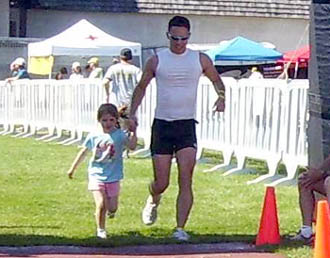Why should your daughter or stepdaughter participate in sports and physical activity? To be more healthy (in mind & body), feel better about herself, learn new skills, stay off alcohol & drugs, defer sexual activity, and … TO HAVE FUN!
Sadly, some people worry that girls are too delicate, unskilled, or inadequate to play sports. To which the smart father and stepfather reply: “Baloney.”
Here are 10 tips to help dads provide the kind of support daughters need.
 1. Make sports fun from an early age. Keep a relaxed approach when she’s young. For example, have athletic-theme parties, like kickball and pizza.
1. Make sports fun from an early age. Keep a relaxed approach when she’s young. For example, have athletic-theme parties, like kickball and pizza.
2. Demonstrate interest in her athletic programs and activities. Attend her games and other extracurricular activities. If you live away from your daughter, be sure to talk with her after every game to hear how it went.
3. Learn the importance of physical activity for girls. Read research from organizations like the Women’s Sports Foundation (e.g.: “Go Out & Play“) and Kids’ Sports Psychology.
4. Leave coaching to the coaches. Tina Syer of the Positive Coaching Alliance says, “You’re there to fill the kids’ emotional tanks and make sure they bounce back from mistakes, not to tweak their throwing motion or tell them where to be on the field.” Be smart about choosing coaches tuned in to her age and skill level. If there’s a lack of adequate coaches, sign up to volunteer!
5. Be a model fan. Cheer hard for your girl, and then cheer for everyone else who is playing, too. Think about what you would look like on the sidelines if someone were videotaping you instead of the game. Be sure you (and your daughter) would be proud of what you’d see. Every kid (and parent) should remember why they call it “playing” sports. And then encourage her to be a fan of college and professional women’s sports like the WNBA—by becoming a fan yourself!
6. Ask, “What do you and I hope to get from the experience?” Then tell her what you hope she gets. If you don’t talk (and listen), she may assume all you care about is a winning record or how good her stats are. Make sure she knows you want sports to be a fun place to make friends, test herself, be healthy, and feel good about herself.
7. Let her play with boys. In Raising Our Athletic Daughters: How Sports Can Build Self-Esteem and Save Girls’ Lives, Jean Zimmerman and Gil Reavill suggest utilizing coed or single-sex programs according to your daughter’s comfort level and what will contribute most to her learning and growth.
8. Help her use “mistakes” productively. When she messes up, she’ll look to you first. So illustrate how to put mistakes in perspective by 1) showing her how to let go of them and 2) encouraging (but not demanding) her to use them as motivation to improve her skills.
9. Make sure girls and boys have equal sports opportunities and resources. Support Title IX and encourage school and other sports programs to be aware of and promptly address inequities. Celebrate and help promote National Girls and Women in Sports Day in early February.
10. Keep a relaxed and fun approach. Team sports teach girls how to be self-reliant while also working collaboratively to be competitive. If she loses interest in sports, you and she can still be physically active together—and books like The Dads & Daughters® Togetherness Guide have plenty of other ways to relate and have fun together.
.
 Joe Kelly is a father, best-selling author, speaker and media source on fathering and other family-related topics. His books include Dads and Daughters®: How to Inspire, Understand and Support Your Daughter and The Dads & Daughters® Togetherness Guide. He is a husband, a father of adult daughters, and lives in Saint Paul, Minnesota. See his blogs, articles, and other resources at thedadman.com.
Joe Kelly is a father, best-selling author, speaker and media source on fathering and other family-related topics. His books include Dads and Daughters®: How to Inspire, Understand and Support Your Daughter and The Dads & Daughters® Togetherness Guide. He is a husband, a father of adult daughters, and lives in Saint Paul, Minnesota. See his blogs, articles, and other resources at thedadman.com.
© Joe Kelly, all rights reserved and used by permission.

